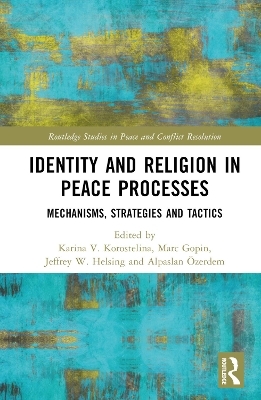
Identity and Religion in Peace Processes
Routledge (Verlag)
978-1-032-78423-6 (ISBN)
Based on multiple case studies, this book unveils the complex role identity and religion play in peace processes across the globe. It demonstrates that the success and sustainability of a peace process depends on the systemic application of the BRIDGE model that is introduced here. This model describes five major strategies (Bonding, Reassuring, Involving, Determining Guides, and Equalizing) and numerous tactics for how peace processes and accords can deal with the central issues as well as important common challenges that run through identity-based ethnonational or religious conflicts. This represents the first comprehensive account of how the transition from enemies to neighbors is achieved and how intergroup relations and engagement are transformed in peace processes, impacting power, access to resources, legitimacy, and representation in national identity. The model also discusses what forms of peacebuilding authentically represent the interests, needs, and values of religious constituencies, and what can be learned from how religious constituencies escalate and de-escalate conflict. The book demonstrates why religion must also be included in peace processes and permanent solutions, owing to religion’s capacity to enhance commitment to bonding and peaceful values, such as justice, compassion, nonviolence, stability, care for children, and care for the environment, for the sick, the wounded, the traumatized, and the bereaved.
This book will be of much interest to students of peace studies, intra-state conflict, religion studies, and International Relations.
Karina V. Korostelina is a professor and director of Peace Lab at the Carter School for Peace and Conflict Resolution, George Mason University. Marc Gopin is a professor and director of the Center for World Religions, Diplomacy, and Conflict Resolution at the Carter School for Peace and Conflict Resolution, George Mason University. Jeffrey W. Helsing is an associate professor and director of the Better Evidence Project at the Carter School for Peace and Conflict Resolution, George Mason University. Alpaslan Özerdem is a professor and the dean at the Carter School for Peace and Conflict Resolution, George Mason University.
Introduction 1.The BRIDGE Model: The Role of Identity in Peace Processes 2. Radical Inclusion and Critique: Religion’s Complex Contribution to both War and Peace Processes 3. Peace Agreement in Northern Ireland 4. Apartheid in South Africa: The Role of Religion and Identity in Brokering Peace 5. Dynamics of Identity in the Angolan Civil War and Peace Process 6. A Peace Agreement in Colombia 7. Nigeria—Kaduna Peace Declaration and Yelwa Shendam Peace Affirmation 8. Sudan’s Comprehensive Peace Agreement: Termination of Africa’s Longest War 9. The Philippines-MNLF Peace Process 10. The Guatemalan Peace Process: Religion and Identity Elements 11. The 1997 Peace Agreement Between the Government of Bangladesh and the United People’s Party of the Chittagong Hill Tracts 12. Serbia and Kosovo’s Dialogue for Peace 13. Sri Lanka: Failures of The Bi-Polar Conflict Resolution and ‘Victor’s Peace’ Reconstruction Modality 14. Complexities of Peace Processes in Ukraine Conclusion
| Erscheinungsdatum | 10.08.2024 |
|---|---|
| Reihe/Serie | Routledge Studies in Peace and Conflict Resolution |
| Zusatzinfo | 5 Tables, black and white; 1 Line drawings, black and white; 1 Illustrations, black and white |
| Verlagsort | London |
| Sprache | englisch |
| Maße | 156 x 234 mm |
| Gewicht | 810 g |
| Themenwelt | Geisteswissenschaften ► Religion / Theologie |
| Sozialwissenschaften ► Politik / Verwaltung ► Europäische / Internationale Politik | |
| ISBN-10 | 1-032-78423-7 / 1032784237 |
| ISBN-13 | 978-1-032-78423-6 / 9781032784236 |
| Zustand | Neuware |
| Haben Sie eine Frage zum Produkt? |
aus dem Bereich


